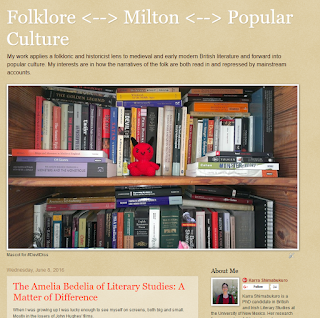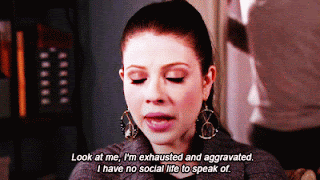I've refocused or rather reclarified that my work is not Milton work, or medieval work, or early modern work, but rather applies a folkloric lens to all of these things. Reexamines and reconsiders the folkloric figures within these texts and the cultural work they do, how they are the vehicle for the fears, anxieties, and desires of the folk at any given historical and cultural moment.
This clarification has helped me focus as I consider my dissertation rewrite on the fact that it is not a Milton dissertation but a Devil dissertation.
I've written before that I've struggled with this issue, and I thought I had fixed this with the help of using my hashtag (#DevilDiss) to focus but apparently not.
So in thinking about the how I write I have to consider what processes I need to strip away because they distract from the product, the goal, of the writing. That being said, I have a lot of things that work for me that I continue to use.
I am a visual person so I still find sketching and planning ideas out on my office whiteboard in different colors very helpful.
For similar reasons I find color coding notes, highlighting, and even colored paper drafts helpful. It helps if I can tell just by looking at something WHAT it is.

My dissertation notes are in blue so my pen ink is blue, my Post-Its are blue, my main highlighter is blue. This may seem silly. Except I do not have the luxury of just writing my dissertation. I also have to teach my classes for UNM and teach high school.
I'm not currently working on any articles for publication, and cannot really afford to attend conferences so I don't have other projects I'm working on but in the past color coding has helped me track all of these projects.
One of the first things I had to do in approaching this re-vision of the dissertation was reread, cut, and start thinking about reorganizing.
So I cut.
And as I read it seemed to me that the argument I wanted to make would most clearly be made according to themes. So that was how I roughly approached the rereading, using color coding to mark passages according to theme (visual rhetoric, religious Others, women, rebellion). This also allowed me to cut anything that didn't contribute to these arguments.
Once this was done I copied and pasted everything into new Google Docs. Then I printed them out. And for the last couple of weeks I've been rereading, and rewriting, these documents.
I find myself in a bit of a chicken-egg situation.I need to figure out how I'm preconceiving the dissertation, while not locking myself into ideas. But I don't know how to reconceptualize and revision the dissertation UNLESS I write out the argument, reshape it, throw stuff out. In a lot of ways this way be a lot of work for nothing. I won't know if something works or doesn't until I do it, and if it doesn't then I have spent a lot of time on useless work.
I have had a committee member very helpfully point out a couple of things I'm keeping in mind. One was that they sat down with me and went through sample chapters with me, showing me models of what they thought would help, footnotes, intros, that type of thing. They also showed me the outline feature in Word.
I don't know how I never knew about this, but it's this super cool tool (under View, Outline) that shows you the first line of every paragraph. It's a great way to check that your topic sentence is making an argument. For me this was the main thing I have to fix with the dissertation-- arguing not listing or describing so this is very helpful. Several people on Twitter have also shared the idea of reverse outlining which I'd never heard of but am looking forward to using once I finish reworking.
Having samples to look at is also helpful. While it won't be an exact model, it does help. I have another meeting in a couple of weeks and I hope to share some rough work to see if I'm on the right track.
I do not have a writing group. I admit to getting a bit pissy when people suggest this as an end all, be all answer. One, it assumes people all make friends, have cohort, have access, social skills to have these groups. Not all of us do. But I am reaching the point where I do need some feedback on what I'm doing, so I'm struggling a bit with that. I have had a couple of people offer to read some preliminary work, which is helpful but I do think I need some more long term, sustained help. But I'm trying to think of different ways to work through this.
For the first three drafts of my dissertation I kept notebooks. I divided these notebooks into chapter sections and then used them to track ideas, jot down notes about callbacks and throughlines.
I felt as though these notebooks were really helpful. I made notes, I printed out images that I found helpful. I could outline arguments and subtopics for reference so I can track things through.
But while they were helpful for making notes about content they were not super helpful for helping with argument. So I'm super conscious of that as I use my new notebook. I'm still using it to track things, and scrapbook ideas, and outline arguments, but I am more focused on the argument.
What I've ended up using so far is a combination of approaches-- a new notebook (still divided by chapters), a working outline of chapters and subtopics, color coded timelines to track primary texts, legal pads for writing insert notes, and my color coded printed draft (we're on pink because this is the second go around with this re-visioning).
As I reread and re-vision and rewrite I plan on adding the key secondary scholarship to this (in a different color of course) so I can make sure that I'm engaging in what I should be.
I guess what has really struck me this last month is how DIFFERENT writing this is from other things I've written. I've shared before how I was taught to write conference papers as a way to focus on MY argument, and then add secondary scholarship to turn it into an article. I've used blog posts --> book chapters in a similar way. This has always helped me make sure my argument was the focus and didn't get lost or buried. But this was how I tried to write the first three drafts of the dissertation and this process failed me.
For me trying to apply this shorter writing approach to the bigger project just didn't work. I'm not sure exactly why but I think I became overwhelmed with trying to prove I'd read everything I was supposed to. With inserting sources. With interacting with some and not others. Any dissertation has a huge scope, but by attempting a chronological history of the devil from the 10th century to the 17th made it bloated and beyond enormous. And I lacked the tools for sorting through, organizing, and creating an argument from all of this information. For me the chronology was also weak because I'm not an Anglo-Saxonist. So the first chapter, my foundational chapter, had huge holes and weaknesses because while I was examining devil figures in Anglo-Saxon texts, me not being an Anglo-Saxonist weakened an already weak argument. There are also issues with trying to apply a historicist lens to these texts, or make arguments about popular literature, the list goes on and on. So one reason for the switch to a thematic approach to chapters, and then building the argument within those chapters chronologically is that it fixes a lot of the original, inherent weaknesses in my argument by both eliminating them and folding them into chapters that work better.
So I sidestep problematic arguments about Grendel as devil (he totally is thought) and instead just focus on the actual devils that appear in Juliana, Guthlac, and Christ and Satan, and Genesis. I drop arguments about what is and is not popular literature and instead frame the texts I use as case studies. Hopefully too showing how female saints interact with the devil from the Anglo-Saxon period up through Margery Kempe shows a throughline in the tradition.
There are of course possible pitfalls to this approach, and not every one is a fan. Correlation does not imply causation. I have to be careful too of applying patterns where there are none. And as one committee member said, the thematic approach is harder to write. All that being said, this is where I'm taking it for now because as an approach it eliminates a lot of core issues. I really believe this thematic, versus chronological, approach is better.
But even if it's not, I'm still rewriting to focus on argument, which could then be rearranged. It's really about what my committee will approve.
But we'll see.So I'm trying new approaches, and trying to use tools that I have used in the past in new ways to try and make sense of all of this.
While this is helpful and I feel making progress, I also admit to still feeling very lost. Because I have lost all confidence that I know what I'm doing, that my content and/or writing is any good. While I am trying to feel confident that my argument and approach is valid, I don't know it is.
On top of all of, well everything, the last almost month, is the very real fact that I cannot see my future anymore.
A year, six months, even three months ago I had a very clear idea of what I was doing. I was teaching high school to pay bills while I re-applied for college jobs. I was presenting at conferences. I was branding myself. I was making me and my work known. I had a publication plan. While much was uncertain, the steps I was taking, and what I was working towards was not.
I was initially told that there was no way I could go on the job market this year and I admit while this should be the thing that worries me most (I can't rewrite this in a year? Two? I have two years of limbo to look forward to?) it's not. It no longer worries me because I cannot see anything in front of me. I cannot see any future for me. I can't see past 5 August when I return to my high school teaching job. I have no idea what my future holds, what steps I need to take, or what work needs to be done. I just have no idea. About anything.
In some ways letting go of any concerns about deadlines is freeing. I can focus on the work I'm trying to do rather than tying myself into knots trying to do something by a certain time. But it's mostly terrifying. Terrifying because I worry that the reason I cannot see my future, my way out, is because I don't have one.
But for now I'm just trying to put one foot in front of the other until I no longer have to think about putting one foot in front of the other.






































